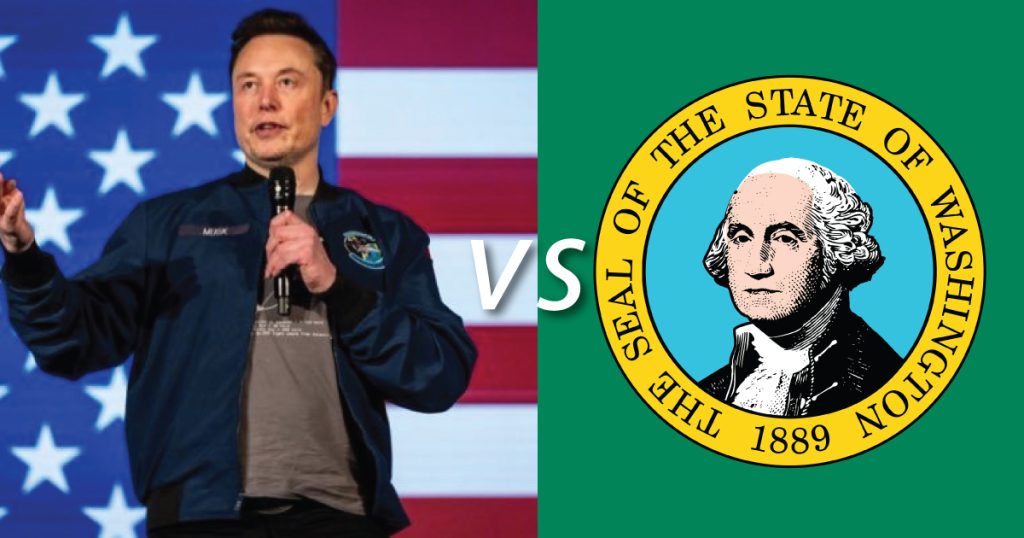WASHINGTON, D.C.—U.S. District Judge Tanya Chutkan on Tuesday, February 18, denied a request for a Temporary Restraining Order (TRO) to halt Elon Musk, the Trump administration, and the Department of Government Efficiency (DOGE) from accessing government data at seven federal agencies.

“The court’s analysis here begins and ends with irreparable harm, ‘a threshold requirement in granting temporary injunctive relief’… Plaintiffs have not adequately linked Defendants’ actions to imminent harm to Plaintiff States in particular… On the record before it, the court cannot conclude that Plaintiffs satisfy the ‘high standard for irreparable injury,’” wrote Judge Chutkan in Tuesday’s ruling.
In a statement to the Lynnwood Times, Brionna Aho, a spokesperson for Governor Bob Ferguson shared that there is a high bar to grant an emergency relief: “The judge made a point of noting the case’s ‘strong merits argument.’”
Washington joined 13 other states on Thursday, February 13, in a lawsuit led by New Mexico Attorney General Raúl Torrez, challenging what the Washington Attorney General’s Office called “President Trump’s unlawful delegation of executive power to Elon Musk.” The lawsuit aimed to block Musk and DOGE from accessing federal data within the Office of Personnel Management, the Department of Education, the Department of Labor, the Department of Health and Human Services, the Department of Energy, the Department of Transportation and the Department of Commerce.
The lawsuit argued that President Donald J Trump violated the Appointments Clause of the U.S. Constitution by creating a new federal department (DOGE) without congressional approval, and by granting Musk sweeping powers over the entire federal government without the advice and consent of the Senate or accountability to the people of the United States.
Judge Chutkan, in Tuesday’s ruling, did agree with the 14 states that a possible violation of the Appointment Clause exists saying, “Musk has not been nominated by the President nor confirmed by the U.S. Senate, as constitutionally required for officers who exercise ‘significant authority pursuant to the laws of the United States.’”
She added that the Appointments Clause aims to prevent “Executive abuses” as Elon Musk “has rapidly taken steps to fundamentally reshape the Executive Branch” without any apparent “source of legal authority” to do so.
However, Judge Chutkan stated that although the states “legitimately” argued what “appears to be the unchecked authority of an unelected individual and an entity that was not created by Congress” this is not within the legal parameters of issuing a TRO.
“It must be indisputable that this court acts within the bounds of its authority,” wrote Judge Chutkan. Accordingly, it cannot issue a TRO, especially one as wide-ranging as Plaintiffs request, without clear evidence of imminent, irreparable harm to these Plaintiffs.”
As with a preliminary injunction, a party seeking a TRO must establish the following:
- that he is likely to succeed on the merits;
- that he is likely to suffer irreparable harm in the absence of preliminary relief;
- that the balance of equities tips in his favor; and
- that an injunction is in the public interest.”
The actions by DOGE resulting in the termination of thousands of federal employees may cause extreme harm to individual employees and potentially federal institutions, according to Judge Chutkan, but the states failed to provide “specific facts” or a “verified complaint.”
The states failed to prove to the court how “mere access” to federal data would create “irreparable injury.” The submission of “widespread media reports” and “news article(s)” by the states in their suit, the court said, could not be taken as “truth.”
Judge Chutkan, is a Washington, D.C.-based appointee of former President Barack Obama. She was the presiding judge over the criminal trial of then-former U.S. president Donald Trump over his alleged attempts to overturn the result of the 2020 presidential election.
The New Mexico Department of Justice led this lawsuit with Arizona and Michigan as co-leads. Washington also joins New Mexico, Arizona, Michigan, California, Connecticut, Hawaii, Maryland, Massachusetts, Minnesota, Nevada, Oregon, Rhode Island, Hawaii, and Vermont.
Musk, the world’s wealthiest man, has taken a forefront role in the Trump administration as the de facto leader of DOGE, or the Department of Government Efficiency. DOGE is not actually a department akin to the Department of Justice or Department of Defense, which are chaired by Cabinet members after a Senate confirmation process. Instead, it’s an executive program within the Obama-era United States Digital Service, which Trump renamed to the “United States DOGE Service” in a January 20 executive order.
EDITOR’S NOTE: Kayvon Bumpus contributed to this article.
Author: Mario Lotmore












